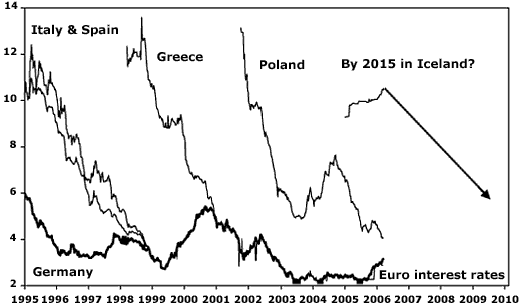Spain Is in Big Trouble
In the last two months, Spain has dumped 80 tons of gold onto world markets. It has also flogged huge quantities of U.S. Treasuries, British gilts, and other similar reserve investments at a similar rate.
Why?
According to an article in London's Daily Telegraph, the Spanish government is running out of money. The Banco de Espana now has less than $17 billion in foreign currency and gold reserves left. This is enough for just 12 days of imports.
The euro is the problem. European interest-rate policy applies to every country that uses the euro as its currency. Problem is, the European countries are all different and their economies move at totally different speeds. Interest rates are the politicians' most important tool for managing the economy. By joining the euro, you're giving up that power.
An example: In the early 2000s, Ireland was struggling with inflation but had to accept interest-rate cuts because – at the same time – Germany was fighting a recession.
Interest rates are set to German considerations. Germany is the largest economy in Europe, and the euro is basically just a new name for the mark. Look at the chart we call the "Euro Convergence Trade." It shows how bond yields in Spain, Italy, Poland, and Greece all converged on German rates when they joined the euro.The Convergence Trade
Interest rates fall dramatically as soon as it's clear
you're giving up your currency and joining the euro

Anyway, Spain has a notorious problem with inflation. And German interest rates weren't appropriate. You guessed it, the ultra-low rates of the last three years have made the Spanish economy overheat. It's a bit like forcing the Mexicans to use the Fed's interest rate policy. Imagine how bad inflation would be in Mexico right now after two years of interest rates at 1%!
The results are amazing. For one, Spain has the largest current account deficit in the industrial world after the United States. This is astonishing for a country with only 40 million people and that until recently was still considered a third-world country. Spain's current account deficit is now 10% of GDP. Household debt has risen to 133% of disposable income... the highest level in the world. (The U.S. ratio has just reached 110%, its own personal best.)
Second, Spain has the largest property bubble in the world. More than 800,000 homes were built last year in Spain, beating France, Germany, and Italy combined. House prices have risen 270% over the past decade. A real bubble in housing construction formed last year. One builder – called Astroc – listed in June 2006. It's stock rose tenfold in the last nine months. Construction now represents 16% of total Spanish GDP.
Now the interest-rate problem is hurting Spain again – but this time its in the opposite direction. You see, the Germans have decided to raise interest rates on the euro. They've risen seven times since December 2005 to 3.75%.
"Spanish housing is about to implode," says Charles Dumas, chief economist at Lombard Street Research.
In Spain, 96% of mortgages use floating rates, but in Germany, most people have fixed-rate mortgages. In other words, the Germans are causing a property crash in Spain.
On April 25, a panic swept through the construction sector of the Spanish stock market. Spain's biggest property group, Sacyr, fell 8.15%, while developers Colonial and Inmocaral plunged more than 11%. And Astroc? Its stock crashed 60%.
What does it all mean? Big trouble for Spain, I think. If the property market goes into a tailspin, it'll lead to a banking crisis and a recession. But the Spanish authorities won't have any power to deal with it as their policy is tied to the euro. Meanwhile, the European Central Bank won't help either. It's forbidden from bailing out member states.
Bernard Connolly, global strategist for Banque AIG and former head of economic research for the European Commission, says, "Spain is going to face the very direst of economic circumstances: a cycle of recession, deflation, and widespread private sector default – a depression in fact. This stock market slide is not just a 'correction'. It has a very, very, long way to go."
You could short sell the Spanish stock market... using the Spain ETF. The Spanish stock market will struggle when the higher European interest rates begin to kick in to those adjustable rate mortgages.
Buy gold is my second suggestion. To me, Spain's problems are the first signs of cracks in the euro's flawed design. Apparently, Greece and Portugal have seen a drop in reserves of foreign currencies just like Spain's. Greece and Portugal also have historical problems with inflation and overheating. Maybe they'll follow Spain down the hole, too? Either way, a huge euro-fiasco can only strengthen gold's case.
No hay comentarios:
Publicar un comentario